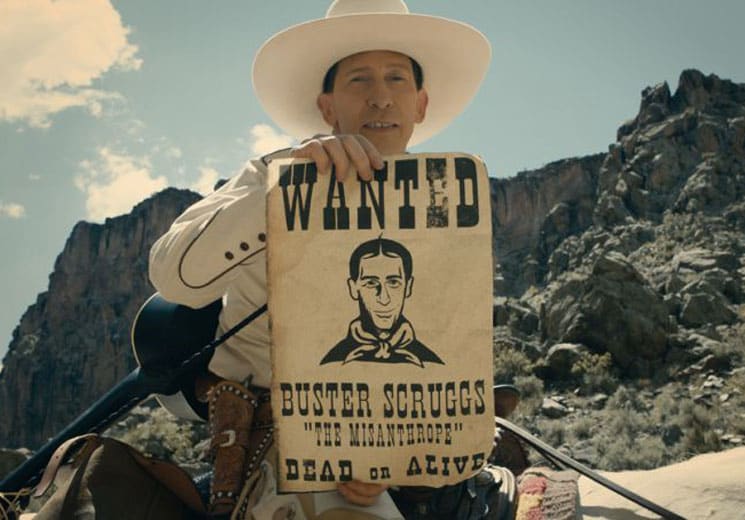The Coen brothers' latest revisits the wild west in a collection of six independent shorts. Visualized as flipping through chapters in an anthology, the film moves through stories such as the opening tale of a goofy gun-slinging, musical misanthrope Buster Scruggs (Tim Blake Nelson) to a gentler exploration of a limbless travelling theatrical impresario (Liam Neeson).
Most notably, the anthology revisits old cowboy tales in full recognition and embrace of the representation of Native Americans as hooting and hollering "savages" that run onto the screen for brief moments to shoot arrows and attempt to cut off scalps.
With a reputation for dark humour and irreverent cultural insight, it's clear the Coen Brothers are not outright endorsing the more problematic aspects of old westerns, but looking to acknowledge and re-visit them. The film calls attention to the racial trope in the same way it demonstrates a thorough understanding of all the tropes of old westerns — from a grizzled prospector (Tom Waits) searching for gold, to James Franco as a rugged outlaw set to be hanged.
But examining the norms of an awkward Southern courtship, or a theatrical desert pistol duel, does not carry the same cultural weight as the "cowboys versus Indians" trope that dominated films of the wild west. Simply putting these images on the screen, as part of a lighthearted black-comedy short, following the story of a gun-happy musical cowboy, needs further interrogation.
The Ballad of Buster Scruggs, after all, exists in a modern context that is not separate from or "beyond" the implications of that cultural moment. The stock caricature of the Native American that was disseminated by the westerns continues to show up and shape misperceptions into present day.
In the film's penultimate story, about travelling the Oregon Trail, a soft-spoken maiden is sitting on her horse, with her brother's adorable dog, when Native Americans begin storming in across the horizon. The white man she is with offers a peace sign, but they attack anyway, and a violent battle ensues. Not unusual for the Coen Brothers, it rests on a dynamic of the audience feeling they are "in on the joke." But when a primarily white Hollywood continues to exercise disproportionate control over representations of First Nations in film and media, who actually gets to be in on that joke?
Re-creating this violent aspect of film history, even in a tongue-in-cheek Coen Brothers kind of way, does not feel like a meaningful or insightful method of interrogating the genre, it just feels glib. The Ballad of Buster Scruggs is not able to carry the weight and implications of the violent trope it so casually throws onto the screen.
(Netflix)Most notably, the anthology revisits old cowboy tales in full recognition and embrace of the representation of Native Americans as hooting and hollering "savages" that run onto the screen for brief moments to shoot arrows and attempt to cut off scalps.
With a reputation for dark humour and irreverent cultural insight, it's clear the Coen Brothers are not outright endorsing the more problematic aspects of old westerns, but looking to acknowledge and re-visit them. The film calls attention to the racial trope in the same way it demonstrates a thorough understanding of all the tropes of old westerns — from a grizzled prospector (Tom Waits) searching for gold, to James Franco as a rugged outlaw set to be hanged.
But examining the norms of an awkward Southern courtship, or a theatrical desert pistol duel, does not carry the same cultural weight as the "cowboys versus Indians" trope that dominated films of the wild west. Simply putting these images on the screen, as part of a lighthearted black-comedy short, following the story of a gun-happy musical cowboy, needs further interrogation.
The Ballad of Buster Scruggs, after all, exists in a modern context that is not separate from or "beyond" the implications of that cultural moment. The stock caricature of the Native American that was disseminated by the westerns continues to show up and shape misperceptions into present day.
In the film's penultimate story, about travelling the Oregon Trail, a soft-spoken maiden is sitting on her horse, with her brother's adorable dog, when Native Americans begin storming in across the horizon. The white man she is with offers a peace sign, but they attack anyway, and a violent battle ensues. Not unusual for the Coen Brothers, it rests on a dynamic of the audience feeling they are "in on the joke." But when a primarily white Hollywood continues to exercise disproportionate control over representations of First Nations in film and media, who actually gets to be in on that joke?
Re-creating this violent aspect of film history, even in a tongue-in-cheek Coen Brothers kind of way, does not feel like a meaningful or insightful method of interrogating the genre, it just feels glib. The Ballad of Buster Scruggs is not able to carry the weight and implications of the violent trope it so casually throws onto the screen.




